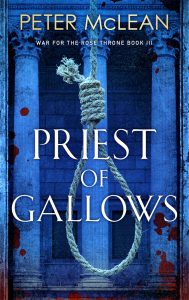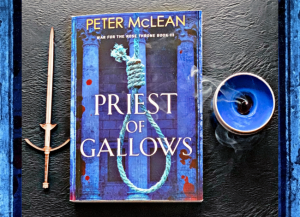PRIEST OF GALLOWS by Peter McLean (BOOK REVIEW)
Please note this review will contain spoilers for Priest of Bones and Priest of Lies.
“We walked in like gangsters, like we own the fucking place, all swagger and weapons and attitude. In business as well as in battle, an approach always has to be tailored to the terrain, to the place and the time, the job or the mission at hand.
This was the right approach for the right time.”
Priest of Gallows by Peter McLean is the penultimate instalment in the War for the Rose Throne quartet. It is another enthralling tale where the seedy underworld of gangsters and deceptive politics go hand in hand, and our narrator, Tomas Piety, must learn to adapt to new roles or face finally meeting Our Lady of Eternal Sorrows. Prepare for a politically charged, addictive read, full of deeply rooted family bonds, devastating trauma and harsh justice, a story where the stakes are raised even higher.
The narrative begins not long after the aftermath of Priest of Lies, where unbeknownst to all, Tomas Piety became Governor of Ellinburg, the city he once ran with his Pious Men. Yet Tomas’ time as Governor is short lived as he soon receives a letter from Dieter Vogel, informing him of the Queen’s sudden death and summoning him back to the capital, Dannsburg. Knowing that Vogel, the superior of the Queen’s Men, is not a man to be kept waiting, Tomas immediately gathers his most trusted companions such as Bloody Anne and his beloved son Billy, and in haste sets off on a journey he’ll never quite forget. No matter how hard he’ll try.
 When I first began this series, Tomas Piety’s first person narration instantly drew me in. This is his memoirs after all, and given that, we are pulled into an intimate account of his life, the good times, the bad and the ugly. Once again Tomas’ compelling, almost hypnotic narrative voice completely captured me, McLean nuances his character in such a way that he is instantly recognisable. The repetition of certain phrases, the way he reminds himself of what people have said, the hints of foreshadowing, they all cleverly work to make his character iconic, it makes the story addictive to read, and in all honesty I always miss his narrative voice after finishing each book.
When I first began this series, Tomas Piety’s first person narration instantly drew me in. This is his memoirs after all, and given that, we are pulled into an intimate account of his life, the good times, the bad and the ugly. Once again Tomas’ compelling, almost hypnotic narrative voice completely captured me, McLean nuances his character in such a way that he is instantly recognisable. The repetition of certain phrases, the way he reminds himself of what people have said, the hints of foreshadowing, they all cleverly work to make his character iconic, it makes the story addictive to read, and in all honesty I always miss his narrative voice after finishing each book.
Tomas has led a life inflicted with trauma and abuse, his time as a soldier has left him with PTSD, and in his own way Tomas is a man with many demons. Over the course of these books we have seen him face his past as well as try to change his future. In Priest of Gallows, we see the battle shock from the war in Abingon still haunts our Tomas. The old vulnerabilities are still there even though he tries to hide it, yet that is understable, war does that, it leaves parts of you broken in various ways, even when you think you’ve left it behind. In his desperation to prevent another war landing on his doorstep, Tomas becomes the very thing that was used to scare misbehaving children. In this book he well and truly becomes a Queen’s Man, and swiftly learns that he is both out of his depth and on familiar grounds. Tomas is a man who essentially wants ‘power, respect and authority’, he desires to avoid ever returning to a life where he had very little control and faced horrors one could never even imagine. Those were the real levers that pushed Tomas Piety to become involved with the Queen’s Men, and as this book focuses more on the political intrigue side, we learn that to become a true Queen’s Man, Tomas is constantly walking on a tightrope. This made for such a gripping story, and what I loved was the way McLean showed the comparison between the Queen’s Men and gangsters. They’re really not all that different – both are deadly to cross. As the Queen’s men ensnared Tomas deeper within their schemes, could he use his skills as the former mob boss of the Pious Men to navigate himself out of their clutches? Or would he become another figure to simply disappear?
Priest of Gallows firmly sits within the grimdark genre, a genre I have recently been struggling with because I’ve felt many books have turned grimdark into something to be merely edgy and shocking with very little depth. Yes, this world is as dark, violent and brutal as it ever was, but with each book McLean never allows this darkness to become a gimmick, or to be gratuitous. Through Tomas Piety’s narration we see him criticise the world, to condemn all the horrifying things he witnesses or even things he actively does. He may not always be proud of his deeds, but those were the times he lived in. He shows us a glimpse into a world that is corrupted to its core, and then reflects on how very wrong, even scary that is. This is what sets this series apart from other grimdark books for me, it has the ability to look at its own society and judge it harshly. As brutal and uncomfortable as some scenes are, you really feel Tomas’ anger, disgust and bitterness at the situation too.
“Dannsburg, the city of lies and whispers and treachery. Aye, that probably suited me better than the blunt honesty of Ellinburg, these days. Was that Our Lady’s plan for me? Would I always be torn between the two, and longing for Varnburg and the clean majesty of the sea that I could never have? That was a philosophical question, I supposed, and I was too drunk for philosophy.”
For example McLean shows us that the horrors of warfare often mirrored the horrors that lurked beneath the depths of the city too. Even in a supposedly sophisticated capital as Dannsburg, there is still the presence of utter savagery, slavery, and of the vile fetishes of those who claim to be noble, to be holy. War may be a terrible savagery act, but at the end of the day soldiers are following orders, to commit inhumane acts in the name of entertainment is far worse. McLean has always strikingly illustrated that those who should display the highest of morals are actually the lowliest of people behind the facade, and it is always satisfying to see Tomas deal out his harsh justice to them.
This isn’t a book without its lighter moments though, as I’ve mentioned there are strong family bonds presented to us through Tomas and his son Billy, his sasura, his brother Jochan and his aunt Enaid. There is a strong friendship between Tomas and Bloody Anne, which brings such solace to Tomas, it made me quite emotional to see. There are moments of humour, of jests and moments of pride. Even if Tomas lies to himself that he doesn’t care, that he’s a cold, calculated man, he isn’t entirely, and it was pleasing to finally see him realise this in Priest of Gallows, after all he is his own best judge.
“If things had been different for my brother and me, I knew, it could have been either of us out on the streets. It could have been one of us picked up and lured into the pit by false promises and simple hunger. People may revere the idea of heroic veterans, but they very seldom have the time or the charity for the broken, battle-shocked men and women that are the reality of what war produces. I had seen too many heroes starve and freeze to death in doorways to think otherwise.”
Soldier, priest, gangster, Governor, Queen’s Man, our Tomas Piety has come a long way, but the man I have loved seeing him being the most is the defender of the downtrodden broken soldiers, the abused, the forgotten. With the way Priest of Gallows ended, I can see that Tomas’ finale is going to see him take on this role to its fullest and Our Lady take anyone who crosses his path.
ARC provided by Jo Fletcher Books in exchange for an honest review. Thank you for the copy!

